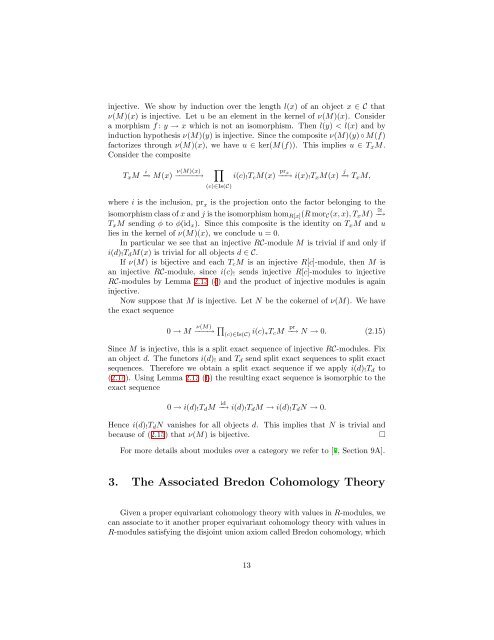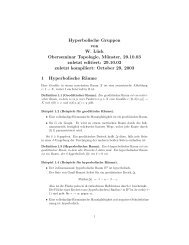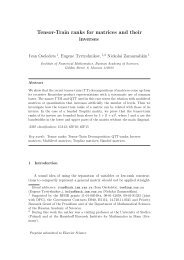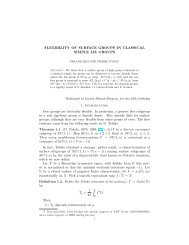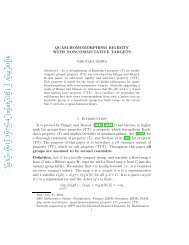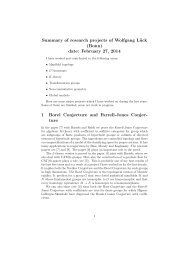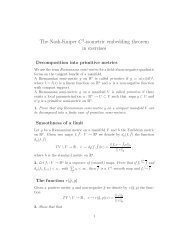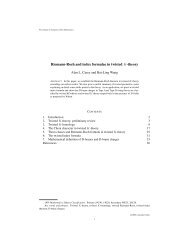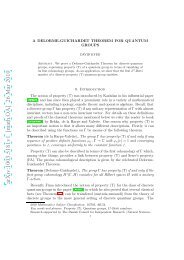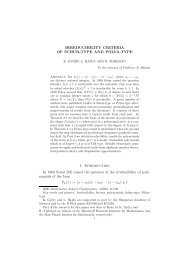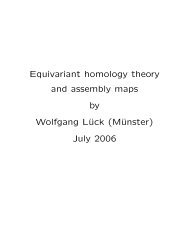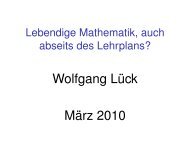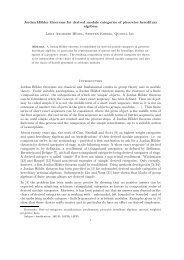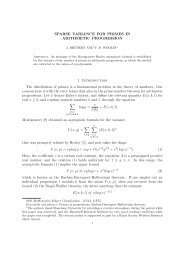Equivariant Cohomological Chern Characters
Equivariant Cohomological Chern Characters
Equivariant Cohomological Chern Characters
You also want an ePaper? Increase the reach of your titles
YUMPU automatically turns print PDFs into web optimized ePapers that Google loves.
injective. We show by induction over the length l(x) of an object x ∈ C thatν(M)(x) is injective. Let u be an element in the kernel of ν(M)(x). Considera morphism f : y → x which is not an isomorphism. Then l(y) < l(x) and byinduction hypothesis ν(M)(y) is injective. Since the composite ν(M)(y) ◦ M(f)factorizes through ν(M)(x), we have u ∈ ker(M(f)). This implies u ∈ T x M.Consider the compositeT x M i −→ M(x) ν(M)(x)−−−−−→∏(c)∈Is(C)i(c) ! T c M(x) pr x−−→ i(x) ! T x M(x) −→ j T x M,where i is the inclusion, pr x is the projection onto the factor belonging to theisomorphism class of x and j is the isomorphism hom R[x] (R mor C (x, x), T x M) −→∼=T x M sending φ to φ(id x ). Since this composite is the identity on T x M and ulies in the kernel of ν(M)(x), we conclude u = 0.In particular we see that an injective RC-module M is trivial if and only ifi(d) ! T d M(x) is trivial for all objects d ∈ C.If ν(M) is bijective and each T c M is an injective R[c]-module, then M isan injective RC-module, since i(c) ! sends injective R[c]-modules to injectiveRC-modules by Lemma 2.13 (c) and the product of injective modules is againinjective.Now suppose that M is injective. Let N be the cokernel of ν(M). We havethe exact sequence0 → M ν(M)−−−→ ∏ (c)∈Is(C) i(c) ∗T c M pr−→ N → 0. (2.15)Since M is injective, this is a split exact sequence of injective RC-modules. Fixan object d. The functors i(d) ! and T d send split exact sequences to split exactsequences. Therefore we obtain a split exact sequence if we apply i(d) ! T d to(2.15). Using Lemma 2.13 (b) the resulting exact sequence is isomorphic to theexact sequence0 → i(d) ! T d M id−→ i(d) ! T d M → i(d) ! T d N → 0.Hence i(d) ! T d N vanishes for all objects d. This implies that N is trivial andbecause of (2.15) that ν(M) is bijective.For more details about modules over a category we refer to [7, Section 9A].3. The Associated Bredon Cohomology TheoryGiven a proper equivariant cohomology theory with values in R-modules, wecan associate to it another proper equivariant cohomology theory with values inR-modules satisfying the disjoint union axiom called Bredon cohomology, which13


